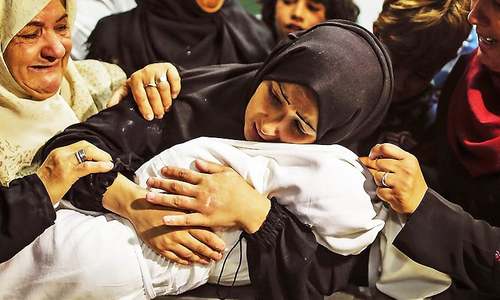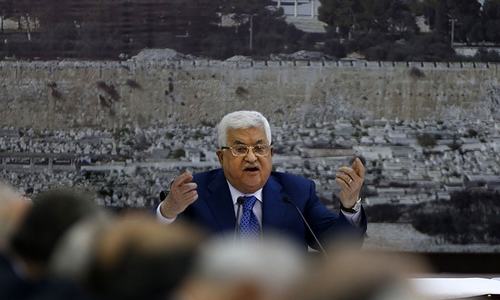The Palestinians on Tuesday asked the International Criminal Court (ICC) to open an immediate investigation into Israeli practices in the West Bank, east Jerusalem, and Gaza Strip setting off a process that they hope will culminate with war crimes accusations against Israeli leaders.
The step drew Israeli condemnation and worsened already poor relations between the sides.
The step, known as a state party referral, seeks an investigation into Israeli settlement construction in the West Bank and east Jerusalem, as well as Israeli military activity in the Gaza Strip, including the recent killing of dozens of Palestinians during mass protests along the border. The Palestinians seek all three areas, captured by Israel in 1967, for a future independent state.
Here is a closer look at the Palestinian move and its implications.
Why did the Palestinians do it?
Peace talks have been frozen since 2014, and the Palestinians have little faith in the Trump administration, which they view as unfairly biased toward Israel.
The immediate spark was anger that United States (US) President Donald Trump moved the US embassy in Israel to Jerusalem last week.
Take a look: US Embassy's move to Jerusalem is another step by the Trump govt to delight Israelis and anger Palestinians
The Palestinians believe the step undercuts their own claims to east Jerusalem. The Gaza bloodshed raised additional pressure on the Palestinian leadership to take action.
US officials have promised to unveil a long-awaited peace proposal in the coming weeks. But the Palestinians have already said they will not accept the US as a mediator.
Why can the Palestinians appeal to the court?
Although the Palestinians do not have independence, the state of Palestine was recognised as a non-member state by the United Nations General Assembly in a landmark 2012 vote.
This upgraded status has allowed the Palestinians to join dozens of international institutions, including the ICC.
Under the terms of their membership, the Palestinians asked the court to investigate Israeli practices going back to June 2014, when they first accepted ICC jurisdiction.
The ICC has been conducting a preliminary probe since 2015 into alleged crimes in the Palestinian territories, including Israel's settlement policy and crimes allegedly committed by Israel and the Hamas militant group in the 2014 Gaza conflict.
Tuesday's referral could speed up a decision on whether to open a full-blown investigation, which could ultimately lead to the indictment of high-ranking Israelis.
What are the specific complaints?
Foreign Minister Riad Malki asked the court's chief prosecutor, Fatou Bensouda, to look into two primary issues: Israeli settlement construction, and Israeli military activity in the Hamas-ruled Gaza Strip.
The Palestinians have long objected to the settlements accusing Israel of gobbling up their land to prevent the establishment of a Palestinian state. Over 600,000 Israelis now live in the West Bank and east Jerusalem, a number that would be extremely difficult, if not impossible, to uproot.
International law prohibits the transfer of civilian populations to occupied territories, and the international community overwhelmingly views the settlements as illegal.
The Palestinians also want action taken against Israel for the deaths of several thousand Palestinians, including hundreds of civilians, during three wars between Israel and Hamas.
Over the past month and a half, over 100 Palestinians were killed and hundreds more wounded by Israeli fire during mass protests along the Gaza border. Some 60 people were killed last Monday alone in protests meant to coincide with the opening of the new US Embassy.
What does Israel say?
Israel annexed east Jerusalem after capturing it in 1967 and considers it an inseparable part of its capital. But that position is not internationally recognised.
It claims the West Bank is not occupied because it was captured from Jordan, and not the Palestinians. Since Jordan has relinquished its claim to the territory, Israel says the area is disputed, and its fate should be decided through negotiations.
Concerning the recent bloodshed in Gaza, Israel has accused the territory's Hamas rulers of using a series of recent mass protests as a cover for attacks and endangering civilians by using them as human shields.
Some of the protesters have burned tires, thrown firebombs or tried to break through the fence. But human rights groups say Israel's open-fire orders are unlawful because they allow the use of potentially lethal force against unarmed protesters at times when soldiers, firing from protected positions on the other side of the border fence, face no imminent threat to their lives.
What can the ICC do to a non-member like Israel?
The ICC is a court of last resort. It is authorised to take on cases that national authorities cannot or will not prosecute.
Israel is not a member of the ICC, and claims it has an independent judiciary capable of investigating any potential wrongdoing by its troops. But rights groups have repeatedly accused the military of whitewashing investigations.
The Palestinians feel their case against the settlements is especially strong, thanks to a previous advisory opinion by the International Court of Justice and statements by other international bodies that settlements are illegal.
Although Israel doesn't accept the court's jurisdiction, its leaders could still be charged by the court.
That would make them subject to international arrest warrants, making it difficult for them to travel abroad.
















































